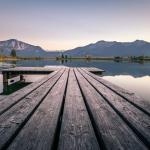
I keep a book titled, The Soul of the World: A Modern Book of Hours, by my bedside. It is a book of photographs and writings, compiled by Phil Cousineau with photographs by Eric Lawton. I read from this book, sometimes, when I am sleepless in the middle of the night.
Actually, it is one of three books compiled and edited by Cousineau that I keep near at hand. The other two are Soul: An Archaeology and Burning the Midnight Oil. I feel in Cousineau something of a kindred spirit. The writings he has collected in these three books are soulful and contemplative. Read in the quiet hours of the night, they penetrate into my depths like John Coltrane’s saxophone or Bach’s Cello Sonatas.
The other night, I read a selection by Rachel Carson, a marine biologist, nature writer, and seminal figure in environmentalism. The selection, from Carson’s, The Edge of the Sea, is about the seashore and how it draws people to its beauty and mystery. The particular section that got my attention contained the following lines:
There is a common thread that links these scenes and memories – the spectacle of life in all its varied manifestations as it has appeared, evolved and sometimes died out. Underlying the beauty of the spectacle there is meaning and significance. It is the elusiveness of that meaning that haunts us, that sends us again and again into the natural world where the key to the riddle is hidden. (italics are mine)
How I once wanted to believe that we could attribute beauty and significance and meaning to nature – to believe that these are intrinsic qualities of the world, rather than something we humans project onto it!
I have always found great beauty in nature, and underlying that beauty, I’ve also found meaning and significance. When I was young, I took it for granted that these attributes were really a part of the world. But as I grew older and was exposed to various philosophies, this conviction was challenged.
I spent several years in my late thirties studying philosophers, naturalists, artists, mystics, and anyone else who wrote of beauty, particularly the beauty of nature. I searched these text and contemplated their content hoping to find some way I could rationally assert that nature really had beauty and meaning. But in the end, I had to concede defeat.
This is not to say I jumped to the opposite pole, the belief that such qualities are purely subjective. I found that the most consistent way of understanding beauty and meaning is that their existence depends on an experiencing subject, but it is the world that provides the material from which the subjective mind generates such experiences. It is in a dynamic interaction between certain qualities of a subject with certain qualities of an object, that beauty and meaning are brought forth.
That so many do find the seashore beautiful is probably due to the great variety of experiences to be had there. Everyday, even every hour, brings something new. Every nook and cranny holds a surprising variety of living things. Along the rocky coastlines, each wave breaks slightly differently from every other wave, and the waves themselves capture sunlight or moonlight in an endlessly sparkling dance. A woodlands, a prairie, the mountains, each in its own way is also filled with great variety; each has a richness easily experienced as beautiful, provided a person attends to it , mindfully,
* * * * *
While I ultimately had to concede that beauty and meaning are not objective parts of the world, I also found a roundabout way in which they real existence. I am a part of the world and my experiences are also a part of the world, including my experiences of beauty and meaning. So though beauty and meaning do not exist in nature outside of mind, they do exist in Nature, in that totality which includes everything that exists, including a human’s experience of beauty and meaning in the world.
* * * * *
The ultimate answer to “the riddle,” as Carson calls it, will not be found at the seashore or anywhere else. The riddle is that this richly varied world exists at all, and that amongst its variety is at least one type of being that can experience this endlessly various world as beautiful and meaningful. As to the solution to that riddle – that the world exists and does so beautifully – well, perhaps cannot be solved. Perhaps part of Nature’s beauty is that each generation can pursue the riddle anew, for it will always be there beyond our grasp.
The theist may assert that “God” is the answer to that riddle – but those are empty words. It uses one riddle, God, to explain another one, this creational world. To use an inexplicable to explain an inexplicable is merely to multiply the inexplicable, which is rather absurd. Let there be just one riddle, one mystery. People will call it what they will. I call it Nature.
If returning to the seashore, or any other natural environment, won’t provide the answer to that riddle, it does allow us the experience of beauty and meaning. And this can move us to reverence and thanks to the Great Riddle, however we conceive it.
__________
Subscribe to The Spiritual Naturalist Society
Learn about Membership in the Spiritual Naturalist Society
The Spiritual Naturalist Society works to spread awareness of spiritual naturalism as a way of life, develop its thought and practice, and help bring together like-minded practitioners in fellowship.
SNS strives to include diverse voices within the spectrum of naturalistic spirituality. Authors will vary in their opinions, terms, and outlook. The views of no single author therefore necessarily reflect those of all Spiritual Naturalists or of SNS.
__________















